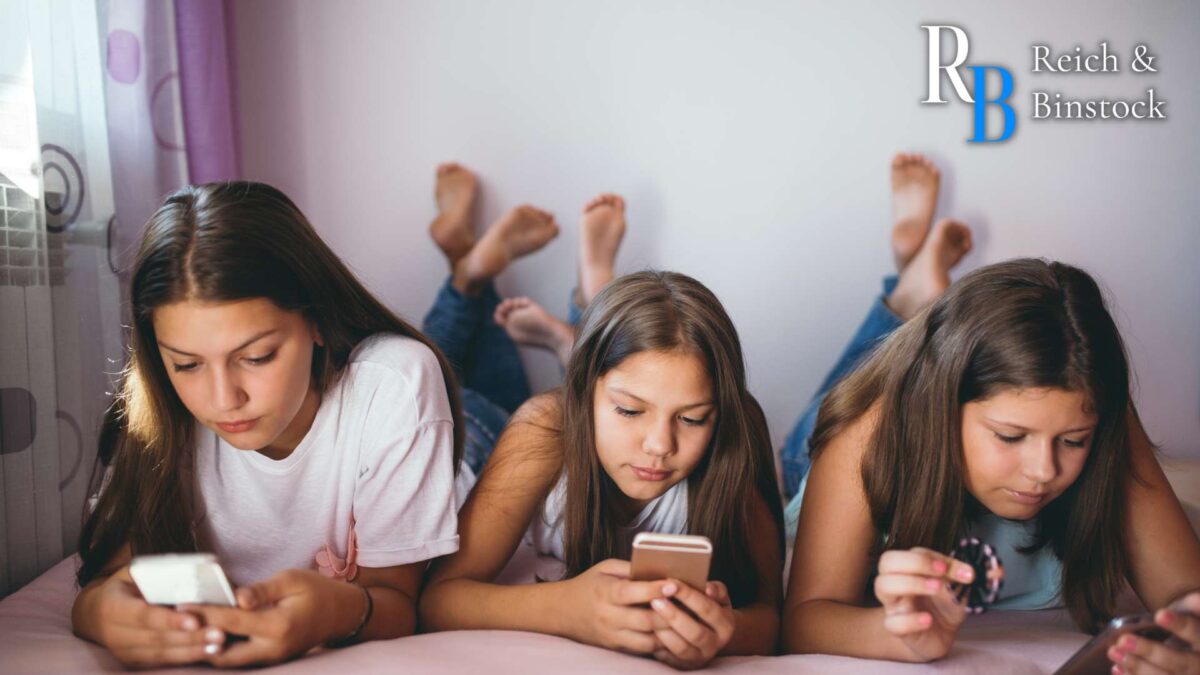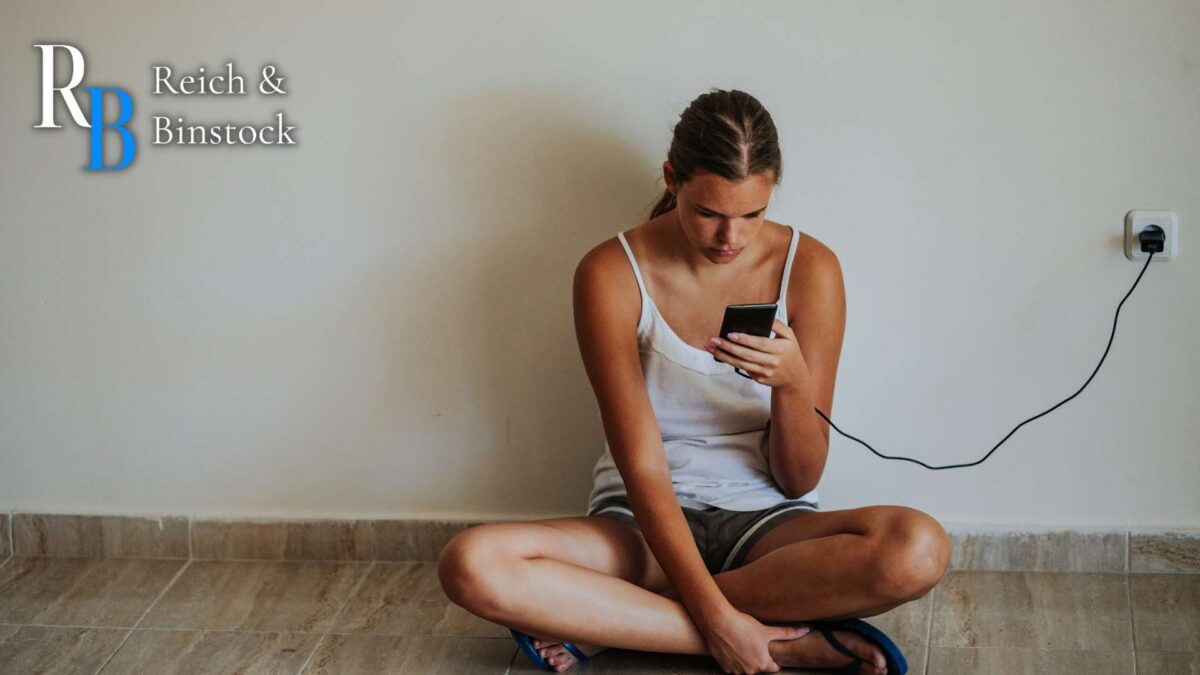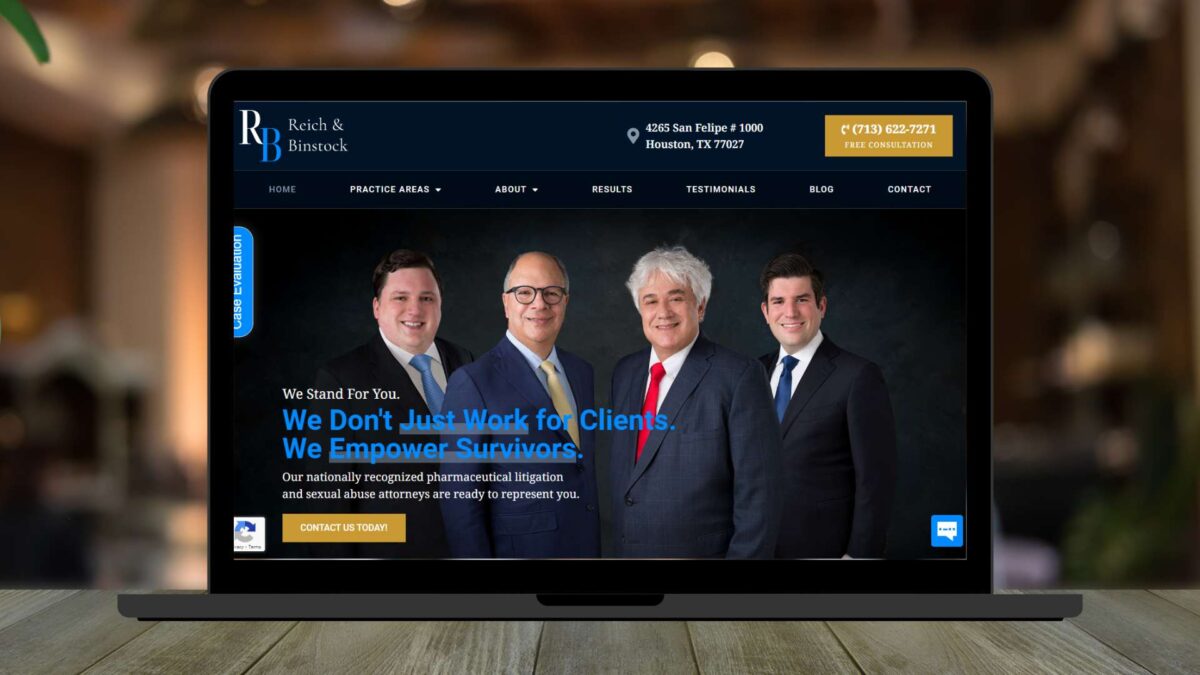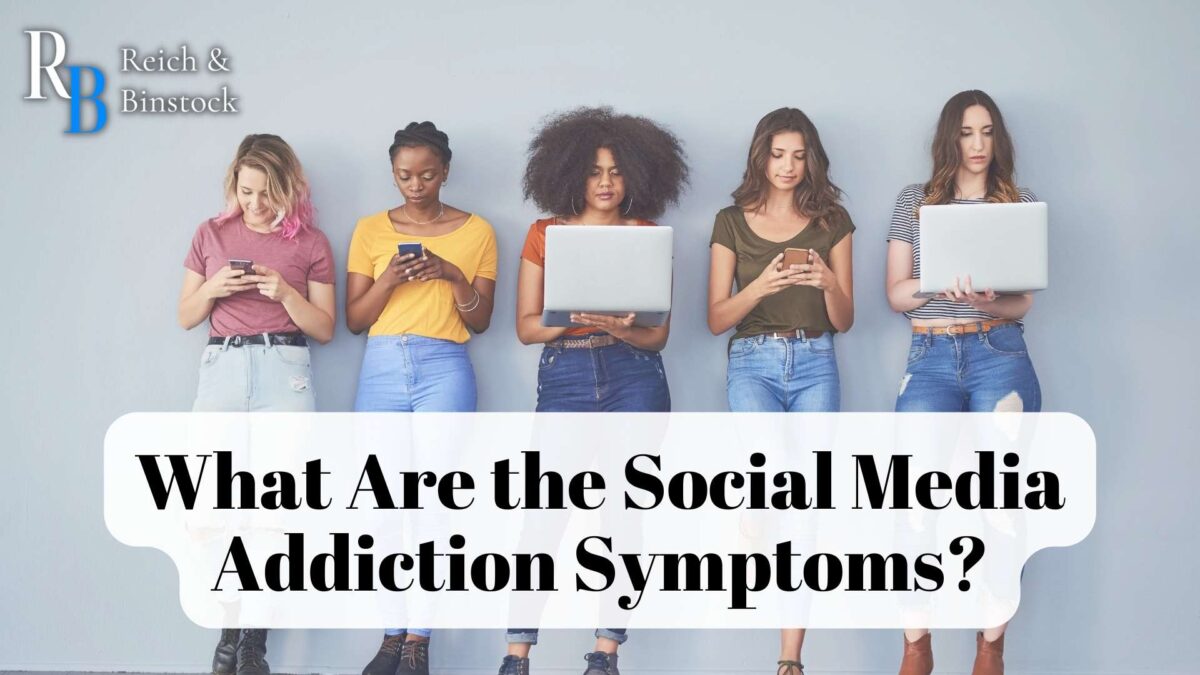Social media addiction manifests through various symptoms that can affect an individual’s daily life, mental health, and overall well-being. At Reich & Binstock, our team of social media addiction attorneys is aware of how these symptoms can evolve into more serious issues.
In this article, we’ll look deeper into the most common signs of social media addiction, including excessive time spent on platforms, neglect of personal relationships, interference with work or school responsibilities, and emotional consequences like anxiety or depression when not using social media.
We hope this overview of social media addiction symptoms can help individuals seeking to understand the implications of excessive social media use and those considering legal action. If you or a loved one has been impacted by problematic social media use, contact Reich & Binstock to learn more about your legal options. Call (713) 622-7271 to schedule a free initial consultation with a social media addiction attorney today.
What Is Social Media?
Social media is a broad range of online platforms that enable users to create, share, and engage with content, as well as participate in social networking. These platforms, from popular sites like Facebook, Twitter, and Instagram to professional networks like LinkedIn, provide a digital space for individuals to connect, communicate, and exchange information.
Social networking sites have altered how we interact, blurring the lines between personal and professional communication and transforming how information is spread and consumed.
Social media’s impact profoundly influences personal connections and shapes worldwide cultural, political, and economic dialogues. This dynamic and ever-evolving landscape continues to redefine our understanding of community and connectivity in the digital age.
Is Social Media Addictive?
So, why is social media addictive for users? This question has garnered significant attention from psychologists, researchers, and legal professionals alike. While not classified as an addiction in the traditional medical sense, social media usage can exhibit addictive-like behaviors. These include compulsive use, an inability to reduce engagement despite the desire to do so, and experiencing withdrawal symptoms when access is limited.
Social media platforms are designed to encourage addictive behaviors, with features like notifications and ‘likes,’ potentially leading to a chronic need for social validation and constant connectivity.
Studies have shown that excessive use of social media can activate the same brain areas as other addictive substances, suggesting a neurological basis for a potential behavioral addiction. However, the debate continues in both scientific and legal circles regarding the classification of social media addiction, its criteria, and its implications for physical and mental health.
Is Social Media Addiction a Real Thing?
Social media addiction refers to a condition characterized by excessive use of social media apps and platforms. While it’s not officially recognized as a disorder in the Diagnostic and Statistical Manual of Mental Disorders (DSM-5), the behaviors and symptoms associated with this overuse are increasingly being acknowledged by mental health experts.
Research in psychology and neuroscience suggests that excessive social media use can cause changes in the brain similar to those in other addictive behaviors, reinforcing the notion that social media addiction could be a real and concerning problem.
This research has led to a growing call for more studies and consideration within the mental health community, as well as among legal professionals and policymakers, to address the potential impacts of social media addiction on individuals and society.
How Many Hours Is Considered Excessive Social Media Usage?
Generally, experts suggest that spending more than two to three hours per day on social media sites may be considered excessive, especially if it interferes with work, personal relationships, or daily responsibilities. However, it’s important to note that the quality of usage and its effect on an individual’s mental and emotional well-being are often more critical indicators of problematic behavior than the sheer number of hours spent.
Excessive usage is typically characterized by a dependency on social media for emotional gratification, a noticeable decline in face-to-face interactions, and a negative impact on personal or professional life.
Social Media Addiction Statistics

Social media addiction statistics provide insights into usage patterns, demographic preferences, and the potential for dependency. Data often reveals high engagement levels among various age groups, particularly teens and young adults, with some platforms showing near-constant use among a significant portion of their users.
Social media sites cater to various age groups, including children, young adults, and older demographics. There’s a significant variation in the age demographics of social media users across major social media platforms. In the section below is data provided by the Pew Research Center regarding social media use among teens:
- 95% of teens use YouTube
- 67% of teens use TikTok
- 62% of teens use Instagram
- 59% of teens use Snapchat
- 32% of teens use Facebook
It’s important to note that around 54% of teenagers admitted having difficulty quitting social media.
What Percentage of People Are Addicted to Social Media?
While the number of social media users who identify as addicts varies, less than 10% of users across all ages would claim to be completely addicted to social media, with about 30% saying they have a mild addiction. Listed below are statistics for each age group’s social media addiction percentages.
- 18-22 Age Group:
- Somewhat addicted: 40%
- Completely addicted: 5%
- 23-38 Age Group:
- Somewhat addicted: 37%
- Completely addicted: 15%
- 39-54 Age Group:
- Somewhat addicted: 26%
- Completely addicted: 9%
- 55-64 Age Group:
- Somewhat addicted: 21%
- Completely addicted: 1%
These statistics highlight that younger adults, particularly those in the 18-38 age range, are more susceptible to social media addiction and related mental health issues compared to older adults.
Why Is Social Media Addictive?
Social media’s addictive nature can be attributed to several key factors that tap into human psychology and behavior. Social media platforms are designed to engage and retain users’ attention, often using algorithms that personalize content to increase engagement. Features like likes, shares, and notifications provide instant gratification and a sense of social validation, similar to other rewarding behaviors. The endless stream of content and the fear of missing out (FOMO) keep users coming back for more.
Social media also provides an escape from reality and a platform for self-expression, which can be particularly appealing. These elements create a powerful lure, making social media sites habit-forming and, for some individuals, leading to addictive patterns of use.
The social aspect of these platforms further complicates this phenomenon, as they are intertwined with how people connect, communicate, and perceive social norms, making it challenging for users to disengage.
How Social Media Affects the Brain
When individuals engage with social networking sites, the brain’s reward system is activated, particularly the release of dopamine, which is responsible for pleasure, motivation, and satisfaction. This release occurs in response to social stimuli like receiving likes, comments, or shares, fostering a sense of satisfaction and validation. Over time, this constant stimulation can change the brain’s reward circuits, potentially altering attention span, emotional responses, and habit formation.
Additionally, the continuous influx of information and social feedback can affect cognitive processes, leading to shorter attention spans and reduced ability to concentrate on tasks. Plus, social media use, especially before bedtime, can lead to poor sleep quality, impacting overall brain health and function. The visual and interactive nature of social media accounts also engages the brain’s visual processing areas, which can enhance visual skills but might also contribute to sensory overload.
How Social Media Affects Teenagers and Youth

Social media largely affects teenagers and youth, influencing their mental, emotional, and social development. The immersive world of social media can shape their identity, self-esteem, and perception of the world. Constant exposure to curated images and lifestyles can lead to unrealistic expectations and comparisons, often leading to low self-esteem and a poor body image.
The instant gratification and validation gained from likes and comments can create a dependency on social media for social approval, impacting their real-life relationships and communication skills.
This age group is also particularly susceptible to cyberbullying, which can have profound effects on their mental well-being, leading to social anxiety, depression, and even affecting their academic performance. On the positive side, social media can offer a platform for self-expression, peer support, and access to information.
What Is Social Media Withdrawal?
Social media withdrawal refers to the physical and psychological symptoms individuals may experience when they decrease social media use. Similar to withdrawal symptoms associated with substance addiction, social media withdrawal can manifest in various ways, including anxiety, restlessness, feelings of sadness or depression, irritability, and difficulty concentrating.
Social network users might also experience a profound sense of missing out or being disconnected from their social circles, leading to a sense of social isolation. These symptoms occur because social media engagement activates the brain’s reward centers. Removing that rewarding stimulation can result in a temporary imbalance in the brain’s chemical makeup.
The intensity of social media withdrawal symptoms often correlates with the level of dependency an individual had prior to disengagement. Social media withdrawal sheds light on the powerful impact online social networking platforms can have on mental and emotional well-being.
What Are the Signs of Social Media Addiction?

Social media addiction symptoms are varied, but there are common indicators of problematic social media use to be aware of. These include spending excessive time on social media platforms to the detriment of real-life interactions and responsibilities, feeling anxious or restless when unable to access social media, and a preoccupation with social media that dominates thoughts and activities.
Other signs include a decline in academic or work performance due to social media usage, withdrawal from family and friends in favor of online interactions, and a reliance on social media for mood regulation. Additionally, users might experience a compulsive need to check notifications and an inability to reduce social media usage despite recognizing its negative impact.
This behavioral addiction can lead to a cycle of dependency, where excessive social media use becomes a central aspect of an individual’s life, affecting their mental health, real-life relationships, and overall well-being.
What Are the Long-Term Effects of Social Media Addiction?
The long-term effects of social media addiction can impact various aspects of an individual’s life. Prolonged excessive and compulsive use can cause anxiety, depression, and feelings of loneliness, intensified by the constant comparison with others and the pressure to maintain a certain online persona.
It can also result in sleep disturbances, either through the blue light emitted by screens disrupting sleep patterns or the mental stimulation from engaging with online media content late at night.
Socially, it can strain relationships as individuals become more absorbed in online interactions instead of face-to-face connections. Additionally, there can be a significant decline in school or work performance due to reduced concentration and productivity.
In terms of physical health, prolonged screen time can cause eye strain, poor posture, and a sedentary lifestyle, contributing to various physical ailments. Over time, the habituation of constant digital stimulation can also alter attention spans and cognitive functions.
What Impacts Do Social Media Platforms Have on Children’s Body Image?
Exposure to a constant stream of curated, edited, and often idealized images can create a skewed perception of beauty and body norms. Children are particularly vulnerable to these influences. They may begin to compare themselves unfavorably to the bodies they see online, which are frequently not representative of the general population. This can lead to negative body image, lowered self-esteem, and, in some cases, may contribute to the development of eating disorders.
The interactive nature of social media can intensify these concerns, as children may internalize negative comments or the lack of engagement on their posts as reflections of their self-worth. The psychological impact on children is significant, highlighting the need for guidance and open conversations about social media and body positivity from an early age to help children navigate social media with a healthy perspective.
Signs You Need a Social Media Break

Recognizing the signs that you might need a break from social media is crucial for maintaining your mental and emotional well-being. These signs include feeling overwhelmed or stressed by what you see on social media, constantly comparing yourself unfavorably to others online, or feeling envious of their lives.
Another key sign is that social media use interferes with your daily responsibilities, such as work, studies, or relationships. If you find yourself compulsively checking your phone for notifications or spending hours scrolling through feeds without realizing it, it’s a clear indicator of addictive social media use.
Additionally, if social media is your primary source of interaction and you’re neglecting face-to-face connections, it may be time to step back. Experiencing anxiety or agitation when you cannot access social media, or if it’s the first thing you check in the morning and the last thing at night, also suggests a need for a break. Taking a hiatus from social media can help reset your habits, provide perspective, and improve your overall quality of life.
What Are the Treatment Options for Social Media Addiction?
Treatment options for social media addiction are diverse and tailored to the individual’s needs. Cognitive-behavioral therapy (CBT) helps individuals identify and modify thought patterns and behaviors associated with excessive social media use. Therapy can also focus on underlying issues like anxiety or depression that may contribute to social media addiction. In more severe cases, counseling or support groups specifically addressing internet or social media addiction can provide a shared space for understanding and coping strategies.
For self-help, digital detoxes, designated periods without social media, can help break the cycle of dependency and improve one’s ability to manage usage. Setting specific goals for social media use, using apps that monitor and limit screen time, and actively engaging in offline activities to replace the time spent on social media are practical steps. In some cases, medication may be prescribed to address co-occurring mental health problems.
When to Seek Professional Help for Social Media Addiction

Seeking professional help for social media addiction is recommended when it significantly interferes with your daily life, meaningful relationships, work, or education. Key indicators include persistent feelings of anxiety, depression, or loneliness that are directly linked to social media use, as well as an inability to reduce usage despite recognizing its negative aspects.
If you find that social media is consistently disrupting your sleep patterns, leading to neglect of personal responsibilities, or causing conflict in your relationships, these are signs that professional intervention may be needed. If you experience withdrawal symptoms such as irritability, restlessness, or mood swings when trying to cut back on social media, this suggests a level of dependency that warrants professional attention.
Professional help can provide strategies to manage and moderate social media use, address underlying mental health conditions, and help develop healthier coping mechanisms. It’s important to remember that seeking help is a positive step towards regaining control and improving overall well-being.
Do I Need an Attorney for My Social Media Addiction Lawsuit?
Social media addiction cases are complex, often involving intricate aspects of technology, psychology, and product liability law. At Reich & Binstock, our experienced product liability attorneys will provide expert advice on how to gather and present evidence that demonstrates the impact of social media addiction on your life.
Your attorney can also negotiate with the involved parties and represent your interests in court if necessary. Since this area of law is relatively new and evolving, having legal representation ensures that your case is handled with knowledge and expertise. During your initial consultation, your attorney can advise you on the potential outcomes of your lawsuit and any possible compensation you might be entitled to for damages incurred due to social media addiction.
Who Qualifies for a Social Media Lawsuit?
Individuals who may qualify for a social media lawsuit are those who have experienced significant harm or damages as a direct result of social media use. This could include mental health issues like anxiety or depression, loss of employment, or educational setbacks attributed to excessive social media use. In cases where it can be demonstrated that a social media platform’s design intentionally encourages addictive behaviors, users may have grounds for legal action.
Instances of privacy breaches, cyberbullying, or other harmful content that directly results in personal harm could also qualify for a lawsuit. It’s important to have documented evidence of the impact and a clear connection between the harm suffered and the social media platform.
Contact a Social Media Lawsuit Attorney at Reich & Binstock Today

If you believe that your life has been adversely affected by social media, it’s crucial to seek expert legal guidance. At Reich & Binstock, our attorneys specialize in product liability lawsuits, including social media addiction claims. We understand the unique challenges posed by social media addiction and are prepared to advocate for your rights and interests.
Whether it’s a matter of personal harm, privacy issues, or the addictive design of social media sites, our experienced team is here to provide the support and representation you need.
Contact Reich & Binstock today to schedule a consultation by calling (713) 622-7271. Let us help you take the first step towards addressing the impact of social media addiction on your life.













